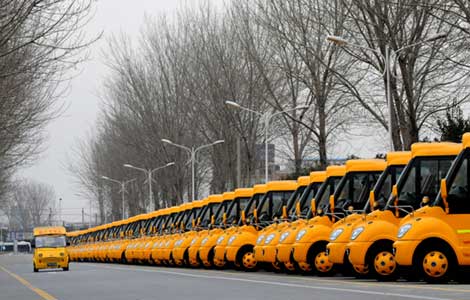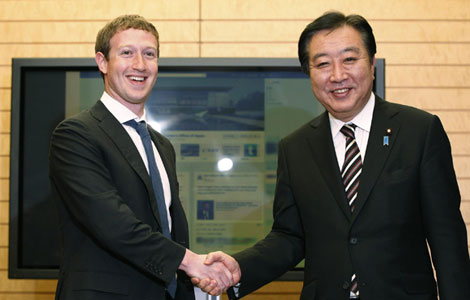 |
|
|
|
|||||||||||
NEW DELHI -- As the Fourth BRICS leaders meeting drew its curtain Thursday in the Indian capital, the leaders of the five BRICS countries issued the Delhi Declaration.
Experts think that at the meeting, the BRICS countries -- Brazil, Russia, India, China and South Africa have achieved positive results in the fields of pushing forward global governance, promoting world stability and strengthening cooperation among BRICS countries.
The Assistant Foreign Minister of China Ma Zhaoxu said after the meeting that the event has met with "full success".
Especially noteworthy is the fact that BRICS countries have achieved during the one-day meeting a substantial agreement on strengthening financial cooperation among them, which showed that BRICS, as a youthful international cooperative mechanism, is moving in a more practical and more mature direction in its evolvement and growth.
Concretization of Financial Cooperation
Chinese President Hu Jintao said at the BRICS Leaders meeting that practical cooperation is an important pillar of BRICS cooperation. This has been proved true at the just-ended meeting as the financial cooperation results have become the most prominent for all the results achieved by the member countries in Delhi this time.
With witnessing by leaders of the BRICS countries, the leaders of state banks of BRICS countries signed a master agreement on extending credit facilities in the local currencies of the five countries and a BRICS multilateral letter of credit confirmation facility agreement.
The two agreements adopt the method of promoting bilateral cooperation in a multilateral framework to promote activities of trade, service and investment with the own currencies of the five member countries within their frontiers, which would be helpful for maintaining sustainable development of these countries.
The President of China State Development Bank Chen Yuan who signed the agreements as representative of China, said that the two agreements are one of the important results of the summit, which has deep and far significant meaning for further deepening financial cooperation among BRICS countries.
According to the agreements, the five BRICS countries can use their own currencies in their bilateral trade, investment and financing activities,which could enable them to reduce dependence on the U.S. dollar,avoid risks in international currency ratings and cut trading costs.
It could also promote the growth of trade and investment between member countries, and help push forward internationalization of the currencies of BRICS countries.
In the Delhi Declaration, all the member countries expressed willingness to study the feasibility of setting up a BRICS development bank, which is aimed at collecting resources and providing financial support to infrastructure and sustainable development projects of BRICS countries as well as other emerging and developing countries.
Analysts say that the cooperative mechanism of BRICS countries is beginning to transform from the model of establishing big framework and general direction to methods of implementing substantial cooperative projects in concrete fields.
This reflects the characteristic of stability and practicality of the mechanism. Moreover, the deepening of financial cooperation among BRICS countries is also helpful to the construction of a more balanced and comprehensive system of global trade, currencies and pricing of commodities, thus exerting deep influence on the global economy.
Commen Voice on Global Governance
At the same time, BRICS countries delivered a bigger common voice at the meeting on upgrading the role of developing countries in global governance, while having had coordination and communication on major international issues of common concern and reaching consensus on several such issues.
According to the Delhi Declaration, BRICS countries called for implementation of the quota reform plan of the International Monetary Fund (IMF), in order to reflect the evolving economic situation of the world, the representation and discourse right of emerging markets and developing countries.
The declaration expressed concern over the slow pace of implementation of IMF's plan on organization quota reform and governance reform, while vowing to work with the greater international community to guarantee timely mobilization of sufficient resources by the world monetary organ help improve its governance and help safeguard its legitimacy as global monetary authority.
BRICS countries also welcomed nominating by developing countries of candidates for future World Bank governorship, calling for transparency and selectiveness in the process of choosing leaders of the IMF and the World Bank. BRICS countries also clarified their common or converging stands on the situation in the Middle East, Syria and Afghanistan.
Analysts say that since its birth, BRICS countries have drawn worldwide attention due to its new international cooperation mechanism. Now the influence of BRICS as a group is increasing day by day, which could become a stimulus in the evolution and innovation of the international order.
Brighter Cooperation Perspective
Looking at the perspective of the growth of BRICS, analysts pointed out that due to different national situation of the five BRICS countries, it is inevitable for them to meet challenges in the process of deepening cooperation.
However, from a general perspective, the BRICS have a brighter perspective and wider space in future cooperation along with the general increase of their economic strength.
Li Zhongmin, a scholar specialized in BRICS cooperation at the Institute of China Social Science, said that while the BRICS countries still stay at the preliminary stage of cooperation, it is essential for their future development of the cooperation to finance each other's infrastructure projects, internationalize their currencies, provide trade credit to each other, ease visa norms, encourage investment in each other's country and lower the trade barriers for each other.
The Delhi Declaration said the BRICS countries will continue building the mechanism of regular ministerial conferences on finance, budget and agriculture, push forward exchanges in science and technology, sustainable development and urbanization.
Among the plans of action included in the Delhi Declaration are intention to carry out multilateral energy cooperation, scholarly evaluation of long-term strategy of cooperation, as well as dialogue on youth policy and population policy.
Chinese President Hu Jintao told the media of BRICS countries before attending the Delhi summit that BRICS countries have solid basis, great potentials and bright perspectives of cooperation.
He said that as long as all member countries follow the principle of gradual opening, unity and mutual assistance, and make common efforts in this direction, BRICS countries will surely achieve new progresses in carrying out substantial cooperation in all fields and bringing benefits to the people of all countries.

|

|

|

|

|

|